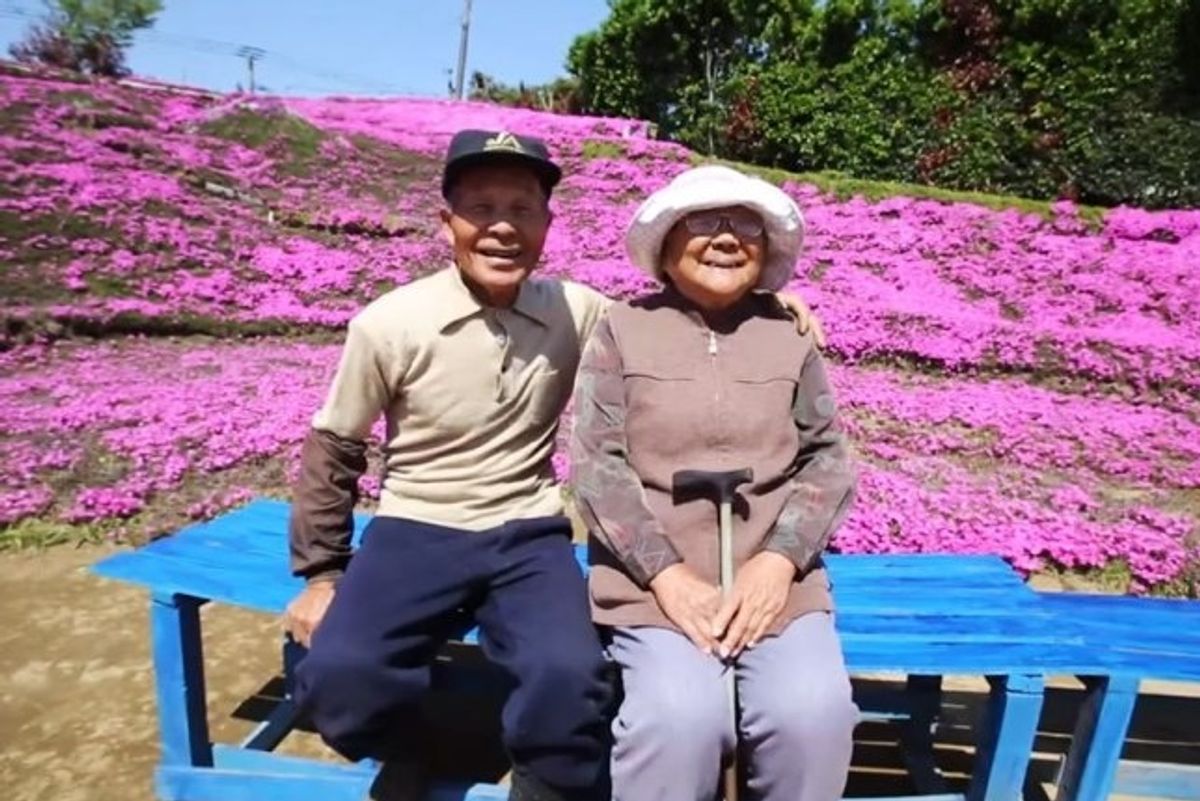Husband spends 2 years planting thousands of flowers to bring his blind wife joy
Husband plants thousands of flowers for his blind wife to smell.

Flowers are a great way to express your feelings for someone. Red roses say, "I love you," but a whole garden of pink flowers screams it. One husband took the romantic gesture of getting your wife flowers to the next level.
Mr. and Mrs. Kuroki got married in 1956, and Mrs. Kuroki joined her husband on his dairy farm in Shintomi, Japan, The Telegraph reports. The couple lived a full life and had two kids. After 30 years of marriage, the couple planned on retiring and traveling around Japan, but those plans were soon dashed.
When she was 52, Mrs. Kuroki lost her vision due to complications from diabetes. Her blindness hit her hard, and she began staying inside all day. Mr. Kuroki knew his wife was depressed and wanted to do something to cheer her up.
Mr. Kuroki noticed some people stopping to admire his small garden of pink shibazakura flowers (also known as moss phlox) and got an idea. He couldn't take his wife to see the world, so he had to make the world come to his wife.
Mr. Kuroki decided to plant more of the flowers in his garden, hoping they would attract more visitors and cheer up his wife. He knew she wouldn't be able to see them, but she would be able to smell them, and their pleasant aroma might bring her some joy. Mr. Kuroki spent two years planting thousands of flowers just so he could put a smile on his wife's face.
光失った妻に芝桜を 黒木敏幸さんと靖子さん夫妻 宮崎www.youtube.com
The plan worked and the stunning garden began drawing visitors to the location. A decade after Mr. Kuroki first planted the garden, the amazing love story behind it has turned the dairy farm in rural Japan into a major tourist attraction.
The garden draws up to 7,000 people a day when the flowers are in bloom in March and April. Their cowshed, which once held 60 cows, has been turned into a display telling their love story. Most importantly, Mrs. Kuroki loves the visitors and can be seen walking around the garden and smiling.
You can visit Mr. and Mrs. Kuroki's flowers with your significant other, but they better be prepared to answer questions as to why they've never done anything like that for you.
This article originally appeared on 7.18.19
- John McCain has died after a brave struggle with cancer. He was a ... ›
- A Korean festival just made 60 tons of free kimchi for those who ... ›
- 15 Countries. $150 Billion. 1 Incredible Student Film. - Upworthy ›
- 11 real-world forests that look like they're straight out of a fairytale ... ›
- Nature - Upworthy ›
- Upworthy ›
- The astonishing reason why women are excluded from making ... ›
- See 9 dazzling photos of the world's most colorful places, including ... ›
- A Japanese artist has completely transformed the art of balloon ... ›
- Introducing hanami: the Japanese tradition that'll make you fall in ... ›
- Mother and daughter reveal how they transformed boring backyard into breathtaking plant paradise - Upworthy ›





 Dexters Laboratory What A Fine Day For Science GIF
Dexters Laboratory What A Fine Day For Science GIF The bread doesn't lie. Facebook/Jaralee Metcalf
The bread doesn't lie. Facebook/Jaralee Metcalf





 luxo jr lamp GIF by Disney Pixar
luxo jr lamp GIF by Disney Pixar Plastic doesn't belong in the ocean.
Plastic doesn't belong in the ocean. A father does his daughter's hair
A father does his daughter's hair A father plays chess with his daughter
A father plays chess with his daughter A dad hula hoops with his daughterAll illustrations are provided by Soosh and used with permission.
A dad hula hoops with his daughterAll illustrations are provided by Soosh and used with permission. A dad talks to his daughter while working at his deskAll illustrations are provided by Soosh and used with permission.
A dad talks to his daughter while working at his deskAll illustrations are provided by Soosh and used with permission. A dad performs a puppet show for his daughterAll illustrations are provided by Soosh and used with permission.
A dad performs a puppet show for his daughterAll illustrations are provided by Soosh and used with permission. A dad walks with his daughter on his backAll illustrations are provided by Soosh and used with permission.
A dad walks with his daughter on his backAll illustrations are provided by Soosh and used with permission. a dad carries a suitcase that his daughter holds onto
a dad carries a suitcase that his daughter holds onto A dad holds his sleeping daughterAll illustrations are provided by Soosh and used with permission.
A dad holds his sleeping daughterAll illustrations are provided by Soosh and used with permission. A superhero dad looks over his daughterAll illustrations are provided by Soosh and used with permission.
A superhero dad looks over his daughterAll illustrations are provided by Soosh and used with permission. A dad takes the small corner of the bed with his dauthterAll illustrations are provided by Soosh and used with permission.
A dad takes the small corner of the bed with his dauthterAll illustrations are provided by Soosh and used with permission. Teaching in a racially and ethnically diverse world.
Teaching in a racially and ethnically diverse world.